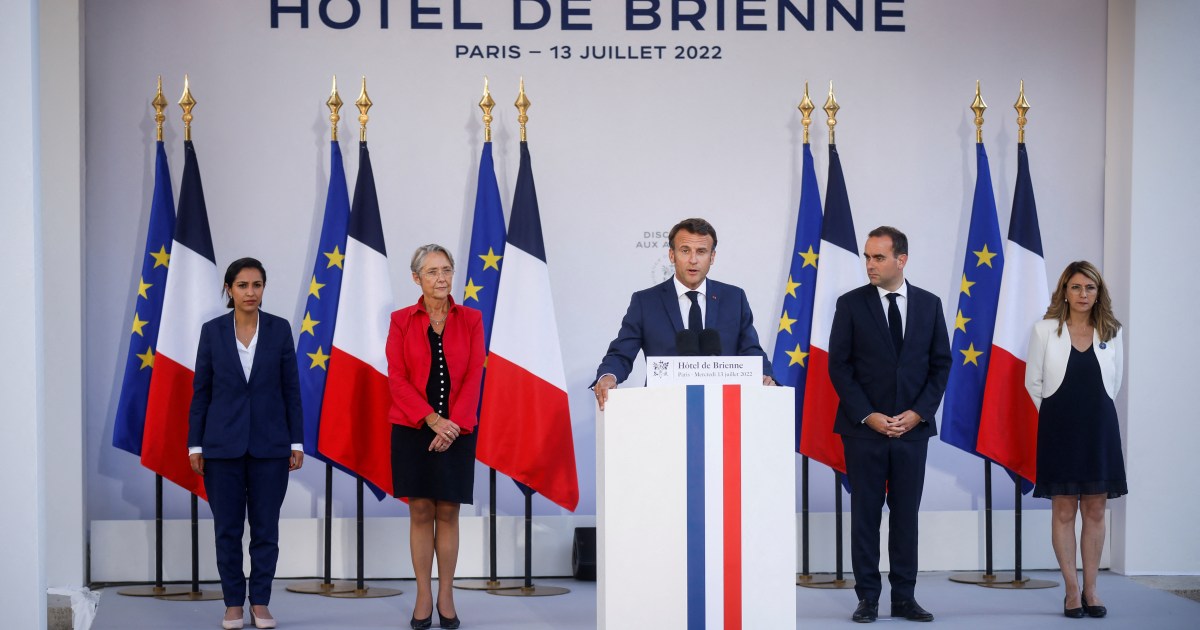Paris -
Under the slogan "Share the torch", and with the presence of Ukraine and Eastern European countries as guests of honor, France celebrates its national day on Thursday, July 14.
And as the French Ministry of Armies announced earlier, this year's slogan symbolizes the torch of the army's association with the French nation, as well as the torch of resistance and the torch of the Olympic Games that France will host in 2024.
France's celebrations of this year's National Day come in special circumstances, as the Russian-Ukrainian war overshadowed the traditional huge military parade that was held on the Champs-Elysees and attended by President Macron, senior French politicians and international guests.
The parade was opened by an infantry battalion of Ukrainian soldiers and Eastern European countries, in a message from Paris and an affirmation of the European dimension of solidarity, in this purely French national celebration.
An elite group of the French force deployed in Romania and a number of Eastern European countries bordering Russia also participated.
symbolic messages
The French-American writer and journalist and strategist at the European Institute for Prospect and Security, Gerald Olivier, points out that France and Macron's message is directed to the eastern European countries that are members of NATO to tell them that France is in solidarity with them, and will not leave them to face their military fate alone.
And he added, in his speech to Al-Jazeera Net, "But the most important message was sent by Macron to Ukraine, which is a strong message of solidarity, although it is symbolic, as well as an affirmation that Kyiv is welcome in the European Union in the coming period, and then in NATO."
He adds that "President Macron, by including Ukraine and its eastern European neighbors in this offer, sent a direct message to Russia that any attack on a member state of the Union will make the Union move and respond with the required force and speed."
For his part, political and strategic analyst Stefan Zomsteig said, "Macron wants to highlight to the French and abroad alike that Europe will remain in solidarity in all the difficult circumstances it is going through, and that Europe's strength is in its unity and solidarity, especially as he has long called for the strategic and military independence of Europe."
He continues, in his speech to Al-Jazeera Net, that "Europe cannot achieve its strategic or political balance unless it achieves its military unity, and provides a force that can defend European countries during crises similar to the current one."
Strategic challenges
In this context, the military governor of Paris, General Christophe Abad, said that this offer confirms "the necessity of strategic solidarity with our European partners on the eastern side."
What are the strategic dimensions of this European political and military solidarity?
Gerald Olivier answers this question that "political, strategic or military dimensions are found in the treaties of the European Union, as well as in Chapter V of NATO's rules of procedure, which require members and partners to show solidarity with each other if a country is threatened or invaded."
Olivier stresses that "the strategic challenges are strong and necessary today, because history and reality teach us when wars begin, but not when or where they end. Therefore, all scenarios are presented today with the expansion of the war and its extension to other countries."
He adds that these messages remind European partners that political and military solidarity is strong because the strategic challenges are one.
It also reminds Russia and warns it against moving forward and expanding the war because the rest of the European countries are not as weak as Ukraine.
inner turmoil
France's celebrations of its National Day on July 14 go back to 1880, when the Third Republic was established.
History refers to two successive events: the first was the fall of the Bastille on July 14, 1789, and the start of the first spark of the French Revolution.
The second was in 1790, the date of the celebration of the first anniversary of the fall of the Bastille, which was marked by an atmosphere of national unity.
While the celebrations came in a shifting international context, and a tense and tense regional and European situation in light of the ongoing Russian-Ukrainian war, this year’s celebrations come, the day after the legislative elections described as a political earthquake, in which Macron lost the compass of power and the absolute majority in the National Assembly, which heralds a period of lack of power. Certainty and political tensions confusing the unity of the national ranks.
In this context, Zomsteig clarifies that President Macron is the president of all French people, regardless of their orientations and affiliations, and he is the supreme commander of the armed forces.
As for Olivier, he points out that this celebration has great symbolic dimensions because it is linked to events that led to the French Revolution.
President Macron, at this celebration, represents the symbol of France's unity, is the commander-in-chief of the armed forces, and the representative of French foreign policy. In this sense, foreign policy can in no way enter into partisan divisions or political rivalries.
However, he added, "What is certain is that President Macron will use the spotlight on him in this historic event, to overcome his recent political and electoral difficulties, and try to appear as a strong president who represents all French people."
He concluded his speech by stressing that the challenges facing France and Europe today, with the presence of the Russian-Ukrainian war, are a thousand times more important than political rivalries and electoral battles in the National Assembly.

